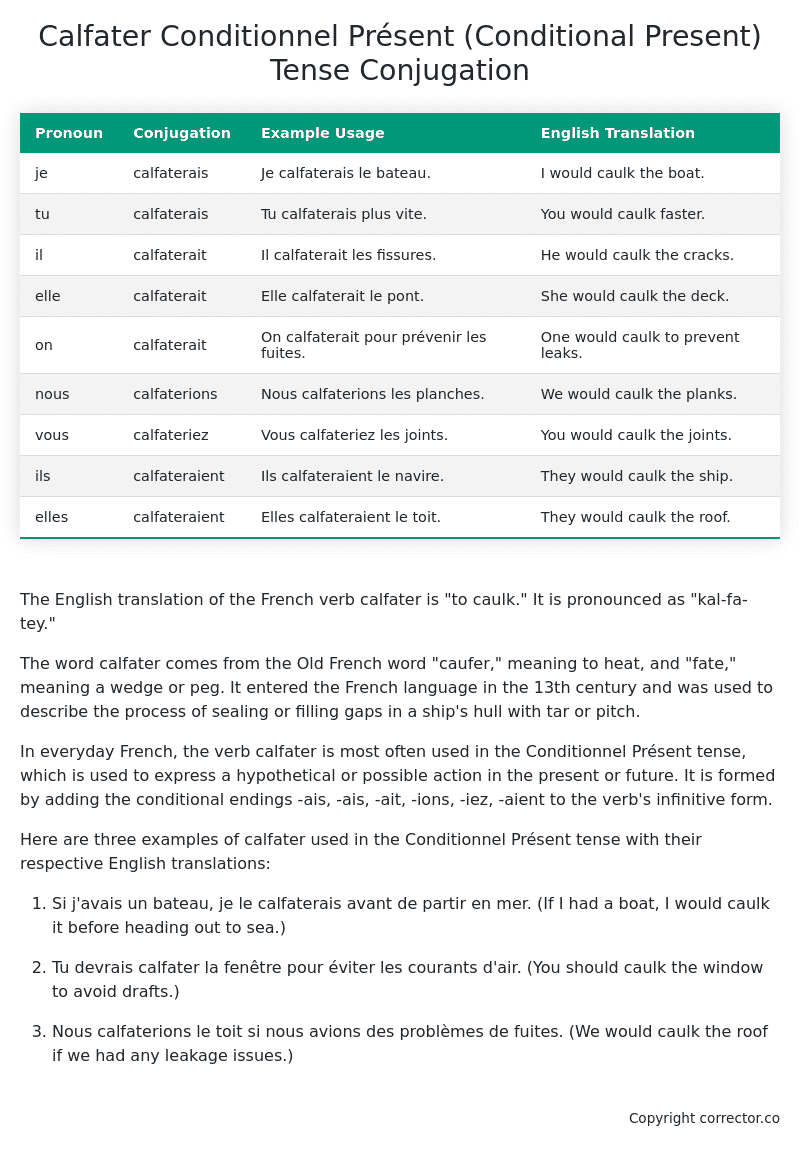Conditionnel Présent (Conditional Present) Tense Conjugation of the French Verb calfater
Introduction to the verb calfater
The English translation of the French verb calfater is “to caulk.” It is pronounced as “kal-fa-tey.”
The word calfater comes from the Old French word “caufer,” meaning to heat, and “fate,” meaning a wedge or peg. It entered the French language in the 13th century and was used to describe the process of sealing or filling gaps in a ship’s hull with tar or pitch.
In everyday French, the verb calfater is most often used in the Conditionnel Présent tense, which is used to express a hypothetical or possible action in the present or future. It is formed by adding the conditional endings -ais, -ais, -ait, -ions, -iez, -aient to the verb’s infinitive form.
Here are three examples of calfater used in the Conditionnel Présent tense with their respective English translations:
-
Si j’avais un bateau, je le calfaterais avant de partir en mer. (If I had a boat, I would caulk it before heading out to sea.)
-
Tu devrais calfater la fenêtre pour éviter les courants d’air. (You should caulk the window to avoid drafts.)
-
Nous calfaterions le toit si nous avions des problèmes de fuites. (We would caulk the roof if we had any leakage issues.)
Table of the Conditionnel Présent (Conditional Present) Tense Conjugation of calfater
| Pronoun | Conjugation | Example Usage | English Translation |
|---|---|---|---|
| je | calfaterais | Je calfaterais le bateau. | I would caulk the boat. |
| tu | calfaterais | Tu calfaterais plus vite. | You would caulk faster. |
| il | calfaterait | Il calfaterait les fissures. | He would caulk the cracks. |
| elle | calfaterait | Elle calfaterait le pont. | She would caulk the deck. |
| on | calfaterait | On calfaterait pour prévenir les fuites. | One would caulk to prevent leaks. |
| nous | calfaterions | Nous calfaterions les planches. | We would caulk the planks. |
| vous | calfateriez | Vous calfateriez les joints. | You would caulk the joints. |
| ils | calfateraient | Ils calfateraient le navire. | They would caulk the ship. |
| elles | calfateraient | Elles calfateraient le toit. | They would caulk the roof. |
Other Conjugations for Calfater.
Le Present (Present Tense) Conjugation of the French Verb calfater
Imparfait (Imperfect) Tense Conjugation of the French Verb calfater
Passé Simple (Simple Past) Tense Conjugation of the French Verb calfater
Passé Composé (Present Perfect) Tense Conjugation of the French Verb calfater
Futur Simple (Simple Future) Tense Conjugation of the French Verb calfater
Futur Proche (Near Future) Tense Conjugation of the French Verb calfater
Plus-que-parfait (Pluperfect) Tense Conjugation of the French Verb calfater
Passé Antérieur (Past Anterior) Tense Conjugation of the French Verb calfater
Futur Antérieur (Future Anterior) Tense Conjugation of the French Verb calfater
Subjonctif Présent (Subjunctive Present) Tense Conjugation of the French Verb calfater
Subjonctif Passé (Subjunctive Past) Tense Conjugation of the French Verb calfater
Subjonctif Imparfait (Subjunctive Imperfect) Tense Conjugation of the French Verb calfater
Subjonctif Plus-que-parfait (Subjunctive Pluperfect) Tense Conjugation of the French Verb calfater
Conditionnel Présent (Conditional Present) Tense Conjugation of the French Verb calfater (this article)
Conditionnel Passé (Conditional Past) Tense Conjugation of the French Verb calfater
L’impératif Présent (Imperative Present) Tense Conjugation of the French Verb calfater
L’infinitif Présent (Infinitive Present) Tense Conjugation of the French Verb calfater
Struggling with French verbs or the language in general? Why not use our free French Grammar Checker – no registration required!
Get a FREE Download Study Sheet of this Conjugation 🔥
Simply right click the image below, click “save image” and get your free reference for the calfater Conditionnel Présent tense conjugation!

Calfater – About the French Conditionnel Présent (Conditional Present) Tense
Formation
Common Everyday Usage Patterns
Expressing Polite Requests
Expressing Hypothetical Situations
Expressing Doubt or Uncertainty
Interactions with Other Tenses
Present Tense
Past Tense
Future Tense
Conditional Perfect
Summary
Want More?
I hope you enjoyed this article on the verb calfater. Still in a learning mood? Check out another TOTALLY random French verb conjugation!


